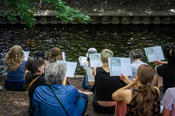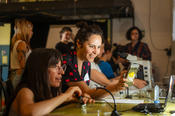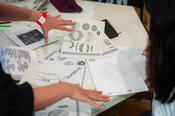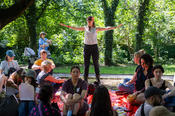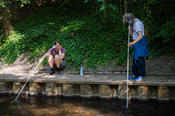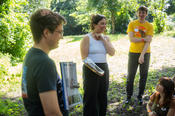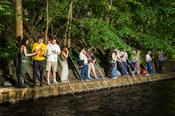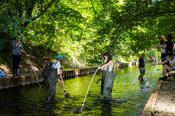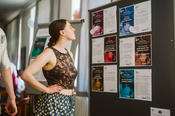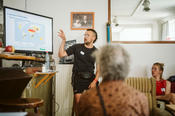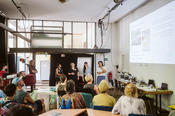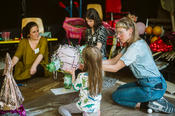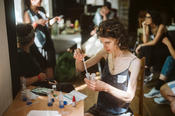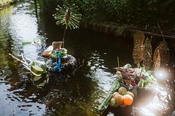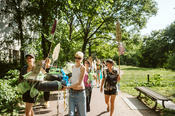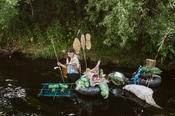BODIES OF WATER Learning from the River Panke through Art, Science, and Storytelling from 21.06.25
On 21 and 22 June Art Laboratory Berlin realised a two-day festival BODIES OF WATER exploring themes around urban waterways, in context of the ongoing series ON WATER | PARCOURS by the Berlin University Alliance (BUA). Along with the art and science collective DIY Hack the Panke and scientists from the fields of ecohydrology and medicine, the public explored what forms an urban river takes and what lives in and around the Panke river.
Encounters with the River – Making visible what is Invisible
The festival began on the morning of 21 June with HYDRO ENCOUNTERS – BECOMING COMPANIONS led by Sybille Neumeyer (artist, researcher) and Fara Peluso (bio artist, bio designer, researcher). At the riverside of Panke, participants collected water samples from the river whole reading and discussing narratives of bodies of and in water as an invitation to amplify perspectives on symbiosis, microbial diversities and waters as shared resources.
Following the reading session the public came together at the PA 58 cultural centre for the first workshop AMPLIFYING RIVER COMMUNITIES with Prof. Dr. India Mansour (microbiologist, Rillig Lab | Ecologies of Plants, FU Berlin), Dr. Joana MacLean (microbiologist, Rillig Lab | Ecologies of Plants, FU Berlin), Sybille Neumeyer (artist, researcher), Fara Peluso (bio artist, bio designer, researcher). This workshop invited citizens of all ages to encounter some of the smallest inhabitants of the river Panke using microscopy, drawing the results, which were then used to make sculptures of algae and other micro-organisms using a variety of crafting methods. Additionally, the members of DIY Hack the Panke, practitioners of different backgrounds – art, design, and science – added breakout sessions on a number of topics such as growing your own algae, or river ecology.
Approaching Flow by scientific and artistic methods
In the afternoon a second workshop BERLIN FLOWS with Dr. Kat Austen (artist, chemist), Nenad Popov (media artist and sound artist), Sarah Hermanutz (artist, researcher), Dr Maria Warter (ecohydrologist, The Leibniz Institute of Freshwater Ecology and Inland Fisheries / IGB), Dr. Christian Marx (ecohydrologist, The Leibniz Institute of Freshwater Ecology and Inland Fisheries / IGB) took participants out to the river Panke where they explored the river through its water and the character of its flow. It’s said you never cross the same river twice, because the water is constantly changing. In this workshop artists and scientists guided participants in experimenting by means of science, art, and exploration, with interventions that invited the River Panke to become a collaborator. With ecohydrologists Christian Marx and Maria Warter participants measured the speed and volume of the river’s flow, while with Austen, Popov and Hermanutz the used sound to explore water qualities and create a performance.
Discussing Water, Bodies and Planetary Health
In the evening the festival presented a Panel Discussion WATER, BODIES, AND PLANETARY HEALTH with Dr. Kat Austen (artist, chemist), Jonas Mauch (Aquatic Ecologist, Leibniz Institute of Freshwater Ecology and Inland Fisheries / IGB), Hélène Furaha Hauch (Medical scholar, Charité), Moderated by Prof. Regine Rapp and Christian de Lutz (Art Laboratory Berlin). This cross-disciplinary panel examined the ways that human-made pollutants enter Berlin’s waterways and how they affect the organisms and ecologies there – in the context of “planetary health”. They discussed the roles of pharmaceuticals, industrial and agricultural products, and microplastics in urban waterways, as well as how to improve the current situation.
The Panel Discussion was followed by a SOUND PERFORMANCE by artists Nenad Popov, Kat Austen, and Sarah Hermanutz based on workshop BERLIN FLOWS from the afternoon, sharing some sound and video samples recorded at and in the river Panke with the public and building these into a multimedia performance. After the SOUND PERFORMANCE there was a reception where the public could meet with the scientists and artists from the day’s programme and discuss over food and drinks.
Water Harvest and swimming objects in the river Panke
On the second day (22 June) the workshop order was reversed with BERLIN FLOWS taking place in the morning and AMPLIFYING RIVER COMMUNITIES taking place in the afternoon. During the lunch break there was a presentation ATMOSPHERIC WATER HARVESTING (AWH) by Johannes Müller, Berliner Hochschule für Technik (BHT) and TU Berlin which delved into upcoming challenges of water scarcity and presented a new device to remotely harvest potable water from the air using renewable energy.
Finally, in the late afternoon, following the workshop AMPLIFYING RIVER COMMUNITIES everyone gathered with the sculptures produced in that workshop on both days for a walk to the Panke and a MICROBIAL PARADE with large floating sculptures that were crafted upon microscopic observations from river (micro)organisms during the workshop. Each sculpture magnified interpretations of forms, patterns, and structures observed under the microscope, transforming the invisible life of the river into tangible, visible sculptures. The event was open to everyone: Neighbors, families, friends, and anyone curious about the river’s ecology or the creative process.

